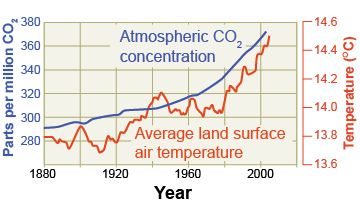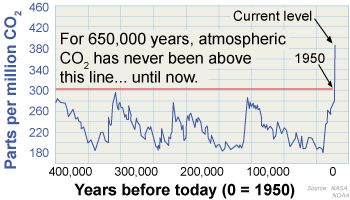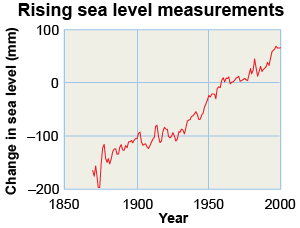|
What could be causing this global warming? The consensus explanation of the scientific community, as reflected in reports from the Intergovernmental Panel on Climate Change, is that human activity is likely to be the main driver. Is this anthropogenic explanation reasonable, based on the scientific evidence? 
|
 One main piece of evidence that points to human activity is that the composition of the atmosphere has changed subtly but significantly over the same time period. The atmospheric concentration of carbon dioxide (CO2), a greenhouse gas, has risen steadily, increasing by more than 25% since 1880. Carbon dioxide is a product of many human activities, particularly the burning of fossil fuels for transportation and electricity generation.
One main piece of evidence that points to human activity is that the composition of the atmosphere has changed subtly but significantly over the same time period. The atmospheric concentration of carbon dioxide (CO2), a greenhouse gas, has risen steadily, increasing by more than 25% since 1880. Carbon dioxide is a product of many human activities, particularly the burning of fossil fuels for transportation and electricity generation. 
|
 Could CO2 concentrations simply fluctuate up and down over time, such that we are in a natural cycle? By using ice cores drilled through antarctic ice, scientists can study the concentration in CO2 over hundreds of thousands of years. Antarctic ice far below the surface trapped a record of the atmosphere’s concentration at the time the ice formed. The data show that current CO2 levels are unique in the past 650,000 years—they are not the result of a periodic fluctuation.
Could CO2 concentrations simply fluctuate up and down over time, such that we are in a natural cycle? By using ice cores drilled through antarctic ice, scientists can study the concentration in CO2 over hundreds of thousands of years. Antarctic ice far below the surface trapped a record of the atmosphere’s concentration at the time the ice formed. The data show that current CO2 levels are unique in the past 650,000 years—they are not the result of a periodic fluctuation. 
|
Many atmospheric gases act as greenhouse gases by trapping some of the Earth’s energy from being radiated into space. If the Earth had no greenhouse gases, it would actually be too cold to support life as we know it! The major greenhouse gas is water vapor, but CO2 also contributes significantly to the greenhouse effect. Other greenhouse gases include methane, nitrous oxides, and chlorofluorocarbons. 
|
 If the evidence of global warming is to be believed, then there should be other global effects caused by warming. This process is one way to analyze, critique, and evaluate scientific evidence and explanations. The effects of climate change have been documented in melting Arctic sea ice, rising sea levels, rising specific humidity, decreasing snow cover, and shrinking glaciers.
If the evidence of global warming is to be believed, then there should be other global effects caused by warming. This process is one way to analyze, critique, and evaluate scientific evidence and explanations. The effects of climate change have been documented in melting Arctic sea ice, rising sea levels, rising specific humidity, decreasing snow cover, and shrinking glaciers. 
|
Progress in science sometimes leads to a broad discussion across society as to what should be done. If human activity is implicated as the primary cause of climate change, then should human activity be modified? If so, how? One common proposal is to change electricity generation to renewable energy sources that do not generate carbon dioxide. Do you think anything should be done to address climate change? 
|
| |
|

